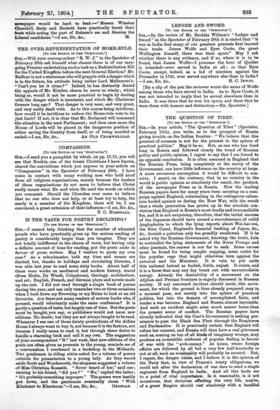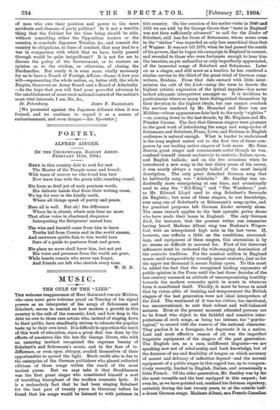THE QUESTION OF TIBET.
[To THE EDITOR OF THE " SPECTATOR.1 SIR,—In your article, "The Question of Tibet" (Spectator, February 13th), you write, as to the prospect of Russia giving trouble on the Indian frontier : " We believe that this greatest of menaces is not for the present in the sphere of practical politics." May it be so. But, as one who has lived long in Russia and followed closely the trend of Russian policy and public opinion, I regret to say that I am forced to an opposite conclusion. It is often assumed in England that the Russian Press, being completely at the mercy of the Government, can have little influence on the country at large. A more erroneous assumption it would be difficult to con- ceive. I assert, on the contrary, that in no country in the world is public opinion so absolutely the result, the product, of the newspaper Press as in Russia. Now the leading Russian papers have for many years been carrying on a cam- paign against England, culminating in the outrageous calum- nies hurled against us during the Boer War, with the result • that a whole generation has grown up in the absolute con- viction that England is Russia's most deadly and irreconcilable foe, and it is not surprising, therefore, that the initial success of the Japanese should have caused a recrudescence of rabid Anglophobia to which the lying reports about Wei-hai-wei, the Suez Canal, England's financial backing of Japan, &c., &c., furnish a pabulum only too greedily swallowed. If it be asked why the Russian Government, knowing the truth, fails to contradict the lying statements of the Navoe Vremya and other journals, the answer is not far to seek. Some excuse must be found for being caught napping, some outlet for the popular rage that might otherwise turn against the autocrat and his Ministers. It is vain to put aside this national hatred as foolish, futile, unjust. It exists, and it is a force that may any day break out with uncontrollable energy. Already the desirability of a movement on the Afghan and Persian frontiers is eagerly discussed in Russian society. If any untoward incident should occur, this move- ment, for which the ground is thus already prepared, may in a moment pass, not merely into the sphere of practical politics, but into the domain of accomplished facts, and render a war between England and Russia almost inevitable. And such an incident might arise much nearer home than the present scene of conflict. The Russian papers have already indicated that the Czar's Government is seeking per- mission to pass the Black Sea Fleet through the Bosphorus and Dardanelles. It is practically certain that England will refuse her consent, and Russia will then have a real grievance such as, coming on top of all kinds of imaginary wrongs, may produce an irresistible outburst of popular feeling in favour of war with the "arch-enemy." At home, where foreign affairs are followed by all but a very few half-heartedly or not at all, such an eventuality will probably be scouted. But, I repeat, the danger exists, and I believe it is the opinion of the Navy that, in view of France's treaty obligations, we could not after the declaration of war dare to send a single regiment from England to India. And all this leads me to a point of vital importance. Is it reasonable, is it not monstrous, that decisions affecting the very life, maybe, of a great Empire should rest absolutely with a handful
of men who owe their position and power to the mere accidents and chances of party politics P Is it not a terrible thing that the Cabinet for the time being should be able, without consulting either the Opposition leaders or the country, to conclude Japanese Treaties, &c., and commit the country to obligations, to lines of conduct, that may lead to a war in comparison with which that we have lately passed through would be quite insignificant P It is not for me to discuss the policy of the Government, or to venture an opinion as to the wisdom, or otherwise, of closing the Dardanelles. But surely it is even more vitally necessary for us to have a Board of Foreign Affairs—frame it how you will—representing the whole nation, or, better still, the whole Empire, than even an Army Board and a Board of Admiralty. —In the hope that you will lend your powerful advocacy to the establishment of some such national control of the nation's most vital interests, I am, Sir, &c.,
St. Petersburg. JOHN F. BADDELEY.
[We protested against the Japanese Alliance when it was formed, and we continue to regard it as a source of embarrassment, and even danger.—En. Spectator.]











































 Previous page
Previous page